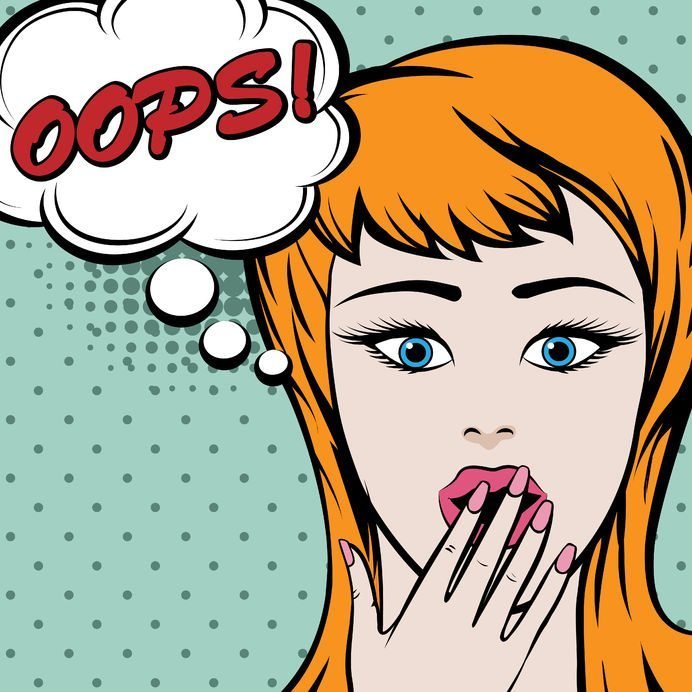Sometimes it takes getting something wrong multiple times before getting it right.
And when it comes down to it, that’s a fundamental piece of learning.
By knowing what something isn’t, you learn what it is, or what it should be.
But why doesn’t everyone seem to learn from their mistakes? One Michigan State University study led by Jason Moser, attempted to answer this very question.
Everyone makes mistakes but how we view them and deal with them, determines a lot about how well we learn.
In Moser’s experiment, researchers measured two reactions to a mistake.
- The first was the error-related negativity (ERN) which appears 50 milliseconds after a mistake and is an involuntary neural reaction.
- The second signal called error positivity (Pe), occurs 100-500 milliseconds after the error. This reaction is voluntary and it involves actively focusing our attention on the mistake.
They found that people who learn more effectively, often demonstrate a larger ERN reading and a consistent Pe response. This means they react to mistakes strongly initially, and more often than not, dwell on the error to try and learn from it.
Moser conducted another related study, to look at the beliefs people have about learning.
Some people tend to have a fixed-mindset which essentially says “you are who you are and nothing can really change that” and others have a growth mindset which says “you can learn anything with enough time and energy.”
Moser started this experiment by asking participants to identify the middle letter in a five-letter sequence like “UUUUU” and UUVUU.” Participants were given a number of such sequences and the task was designed to be monotonous/boring, to encourage people to lose focus and inevitably make a mistake.
For those with fixed mindsets, mistakes were terrible failures. For those with growth mindsets, mistakes were a necessary step to growth.
Growth mindset participants were much better at learning from their errors in the study.
After making a mistake, they showed clear spikes in accuracy, during subsequent attempts. They also generated a higher Pe signal indicating they paid more attention to their mistakes. This was up to three times higher in some cases. The higher Pe scores correlated with the improvement in accuracy, indicating that they are related.
Another study, was conducted by Carol Dweck and Claudia Mueller (Columbia University), in twelve different New York City Schools. They gave more than 400 students in the fifth grade a fairly easy test of nonverbal puzzles.
After the tests, the researchers told the student’s their scores, accompanied by one of the following two compliments. “You must be smart at this” or “You must have worked really hard.”
After that, for their next test, students were presented with a choice between two tests. The first was an easy test like the one they already did and the second was a more challenging one which offered them potential to learn. The results were dramatic and the single line of praise had quite an effect.
Out of the students who were praised for their efforts, 90% chose the harder test. While most of the students praised for their intelligence went for the easier test.
So why does Dweck think there is such a big difference? She thinks that when being praised for intelligence, we are encouraged to look smart and therefore not take the risk of making a mistake.
In her next experiment, Dweck demonstrated that fear of failure can actually limit learning.
She decided to give the same fifth graders an extremely challenging test designed for eighth graders, to see how they’d respond to the challenge.
As you might have expected, those praised for their efforts worked hard to try to figure out the puzzles. But the kids that were praised for their intelligence got easily discouraged, as they saw the mistakes they made as a sign of failure.
In the next round of the experiment, Dweck gave the fifth graders the first easy test one more time.
Remarkably, those praised for their effort showed an improvement of 30% since they were willing to challenge themselves and make progress. But for the children who were assigned to the “smart” group, their scores dropped by nearly 20%. They had experienced failure on the eighth grade level test and let the setback get the better of them, without learning anything from it. So their skills had actually regressed.
From these scientific studies we can apply the following four tips to make us learn faster from our mistakes.
- Adopt a growth mentality, where you focus on the potential to improve.
- Acknowledge and reward yourself for the efforts that you make.
- Recognize that making mistakes in the beginning, can actually give you better results later.
- Realize that fear of failure can actually cause your skills and learning to regress. So welcome mistakes and failure but make sure you pay enough attention to them, so you keep learning and getting better.

